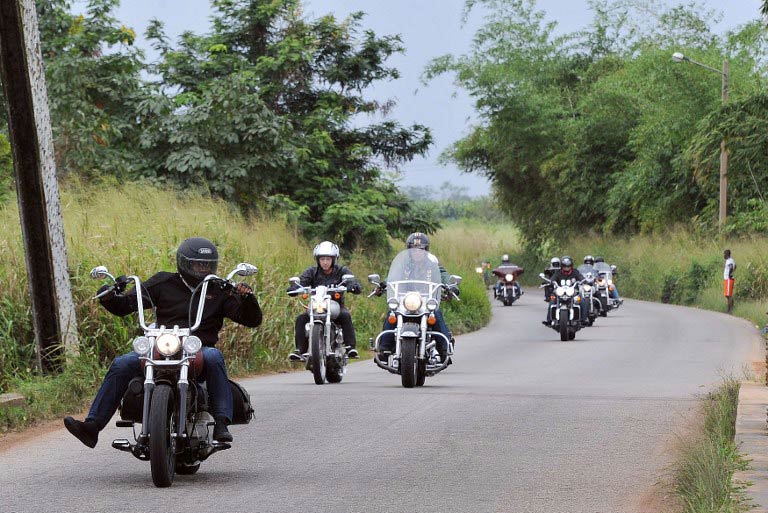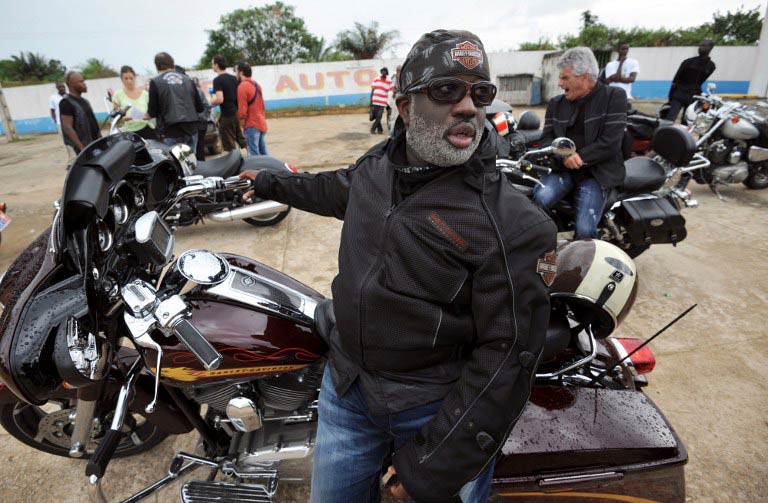Decked out in leather gear, their powerful Harley-Davidsons girded in sleek chrome, the Elephant’s Bikers make an almost surreal sight in the poor and sometimes barren Côte d’Ivoire villages they visit.
As the west African country’s “Easy Rider” team roars into communities where residents are lucky to own a rundown moped, ecstatic crowds typically form to greet them on their journey from the economic capital Abidjan to the industrial port of San Pedro almost 400 kilometres to the west.
Wherever the club makes a pit-stop for supplies, men, women and children flock around the 30 or so bikes and their owners. Young drink-sellers use ageing cellphones to snap pictures of the Harleys and grinning villagers chat to the bikers.

“We’re sharing a pleasure, a dream. People identify with that. They see that it’s accessible, it’s not just on television,” says one of the bikers, Landry Ouegnin.
“Just because we live in an underdeveloped country doesn’t mean we can’t share this kind of thing,” adds the 34-year-old business manager, who helps run the club of inveterate riders.
The Elephant’s Bikers, created 10 years ago to mark the centenary of legendary American motorcycle maker Harley-Davidson, has about 50 members – mostly native Ivorians, but also expatriates, some of whom have become citizens of Côte d’Ivoire.
The whole gang displays the distinctive signs of a pack like the Hells Angels – bandanas, omnipresent skulls and crossbones, leather jackets with the Harley logo or that of their club, an elephant wearing cowboy boots.

For Jackie Thelen, who leads the club and came from France to take on Ivorian nationality, the regalia is “a disguise” that unites members with “a spirit of brotherhood” like in other such groups scattered around the world.
“You’ll often see a big boss show up with ripped jeans, a flashy belt and skulls even though he’s in charge of a highly rated company. That’s the paradox among Harley-Davidson lovers,” says Thelen (52), who runs a business himself and sports a ring in his left ear.
Benevolent bikers
In Côte d’Ivoire, the bikers are anything but bad boys, in contrast to the reputation of notorious counterparts like the Hells Angels. And their rides are expensive. Including the cost of transport and import duty, the cheapest bike in the club cost four million CFA francs ($8 200), while the most pricey cost 25-million ($52 000).
Such sums are way above the means of most villagers along the bikers’ route, but they sometimes help the people they meet by making donations to schools, medical dispensaries or entire villages.
While some members of the club are not wealthy and assembled their own bikes, most are well off and a few are very rich.
A son of late president Henri Konan Bedie is a member, together with an adviser to a cabinet minister. To protect such prominent figures, paramilitary police follow the pack in a four-by-four truck and occasionally direct traffic.
Once they reach San Pedro, after a trek that began in the rain and has been strewn with potholes, the bikers are all smiles.
“That was wonderful!” shouts Gerard Lokossou (41) at the end of his first outing with the club.
A marketing director of 41 who has ridden with a biker group in the US state of New Jersey, Lokossou says he experienced the same joy being part of the Ivorian horde.
“It gave me a chance to discover a part of the country that I had never seen from that point of view,” he says, as wide-eyed staff from the hotel where the Elephant’s Bikers are staying film the group’s arrival.
Joris Fioriti for AFP







